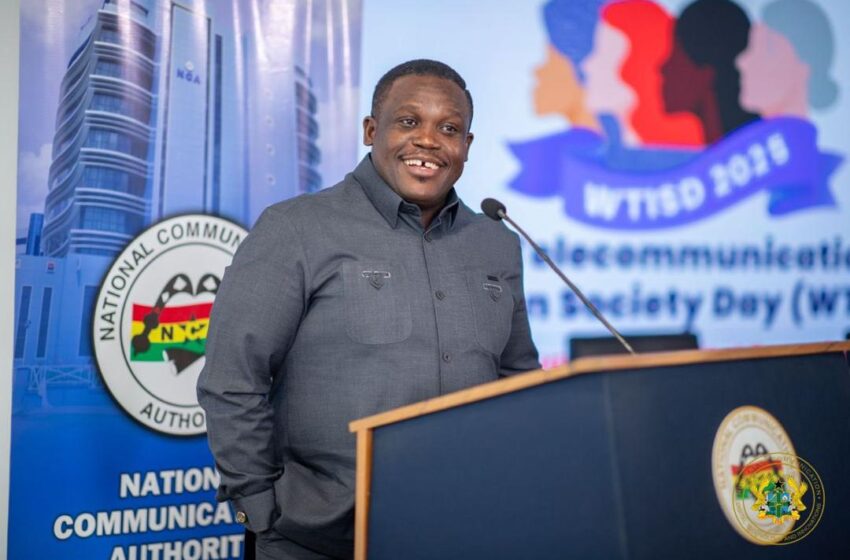Minister promises lower DSTV prices after high-stakes meeting with MultiChoice

Minister Samuel Nartey George demands lower DSTV fees
Ghana’s minister for communication, digital technology and innovations, Samuel Nartey George has pledged to secure a reduction in DSTV subscription costs, a move that has sparked nationwide interest and renewed debates about pay-TV regulation and consumer protection in Ghana.
Price Hike Complaints Trigger Ministerial Action
Over the past year, Ghanaians have voiced increasing frustration over the frequent price hikes by MultiChoice Ghana, the local provider of DSTV services. Social media platforms have been awash with calls for the government to step in and regulate the pricing structure, particularly as consumers battle economic challenges, inflation, and declining purchasing power.
These complaints appear to have prompted Minister George’s direct intervention. His decision to summon MultiChoice executives, including the Group CEO from South Africa, reflects a growing sense of urgency among policymakers to protect Ghanaian consumers from exploitative pricing trends.
DSTV Meeting Set on Public Holiday Underscores Urgency
Interestingly, the crucial meeting was scheduled for Friday, July 4th, 2025—a statutory public holiday in Ghana. This unusual move signals that the government considers the issue pressing enough to override normal protocols in order to achieve swift results.
“I invited the senior leadership of MultiChoice Ghana to a full-out dialogue on subscription pricing in Ghana. The meeting addressed public concerns about affordability, value for money, and fairness in service delivery,” he was quoted as saying.
“I made it clear the Ministry’s expectation that pricing structures must be responsive to Ghana’s economic context. I have a meeting scheduled for tomorrow, Friday — even though it’s a public holiday — with the Ghana team and their South African counterparts. They arrived tonight to agree on a way forward on the issues raised.
“I make you one promise, I won’t leave tomorrow’s meeting without securing a drop in the price of DSTV. That is a solemn promise I make to you.”
Nigeria’s MultiChoice Model Offers a Precedent
Observers have pointed out that MultiChoice Nigeria recently slashed the price of its decoders by 50% and offered free upgrades to higher DSTV packages as a response to customer attrition and regulatory heat. The company had lost over 1.4 million subscribers in Nigeria alone over a 24-month period, according to verified industry reports.
Ghanaians are now asking: If Nigeria could force MultiChoice to reconsider its pricing and packages, why not Ghana?
Minister George appears to be asking the same question—and demanding answers backed by action.
Could Ghana Introduce Pay-TV Regulatory Measures?
While Ghana has traditionally allowed satellite TV operators to self-regulate prices, this episode may signal a turning point in the government’s approach to digital content delivery. Should negotiations fail to yield meaningful relief, the Minister may push for statutory frameworks or licensing reforms that would empower the National Communications Authority (NCA) or other bodies to cap or control subscription prices.
Industry insiders believe the government is weighing multiple options, including:
-
Mandating tiered pricing based on consumer demographics.
-
Introducing subsidised packages for students and low-income families.
-
Setting up a regulatory task force to monitor pay-TV pricing and service delivery.
Public Expectations Ahead of Outcome
Across Accra and other urban centres, many DSTV users are hopeful but cautious. While the Minister’s commitment has drawn praise, there’s concern that MultiChoice may resist price adjustments, citing rising operational costs, currency volatility, and content licensing fees.
However, public pressure is mounting. Consumer advocacy groups and civil society organisations have indicated their readiness to mobilise nationwide petitions and protests if MultiChoice fails to cooperate in good faith.
Why This Matters Beyond DSTV
This case goes beyond a single company or product. It touches on larger themes including:
-
Digital access equity in Africa
-
The responsibility of multinational companies to respect local realities
-
Media affordability and inclusiveness
-
The role of government in protecting consumers in semi-regulated markets
Minister George’s bold move could set a continental precedent and potentially encourage other African countries to confront similar pricing injustices in their telecommunications and entertainment sectors.
READ ALSO
DStv sports-only subscription: A game-changer for African football fans?
10 things MultiChoice can do amid rising subscriber loss
MultiChoice history: From Pay‑TV pioneer to facing digital disruption
MultiChoice cuts DStv decoder price by 50% to attract subscribers
MultiChoice 50% price cuts: Has Satellite TV era come to an end?
John Ugbe, other top MultiChoice executives set to be arraigned, see reason
From over N15k to N12k — how MultiChoice reversed DStv, Gotv prices after backlash
Full list: Multichoice increases DStv, GOtv subscription prices… see new rates
“Why I haven’t renew my DStv subscription since May 2024 — Lagos resident speaks
MultiChoice in crisis: Price cuts, subscriber exodus, and the battle for relevance
MultiChoice, MTN Group… top 10 African businesses owned by South Africans
MultiChoice price cuts: What it means for Nigerian subscribers and the future of pay TV
Explainer: Why MultiChoice keeps increasing DStv and GOtv prices in Nigeria
What’s Next: Eyes on Friday’s Verdict
The outcome of the Friday meeting will likely shape the future of pay-TV in Ghana. If Minister George successfully secures a pricing agreement, he will not only deliver economic relief to households but also solidify his legacy as a public servant who took on a media giant and won.
But if negotiations stall or fail, it could trigger policy escalations and public backlash against both MultiChoice and the government for not taking stronger action.
Either way, this isn’t just about DSTV—it’s about fairness, access, and accountability in a digital age.
With thousands of families relying on DSTV for information, education, and entertainment, a reduction in subscription prices would be a welcome development for many Ghanaians. Whether that change happens now or later depends on the resolve of policymakers, the cooperation of MultiChoice, and the power of public opinion.

